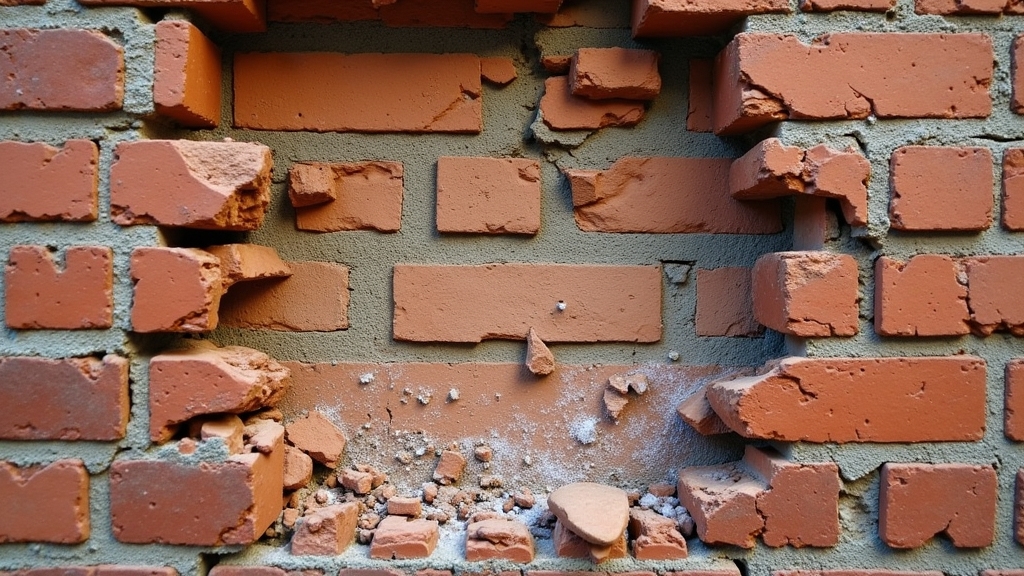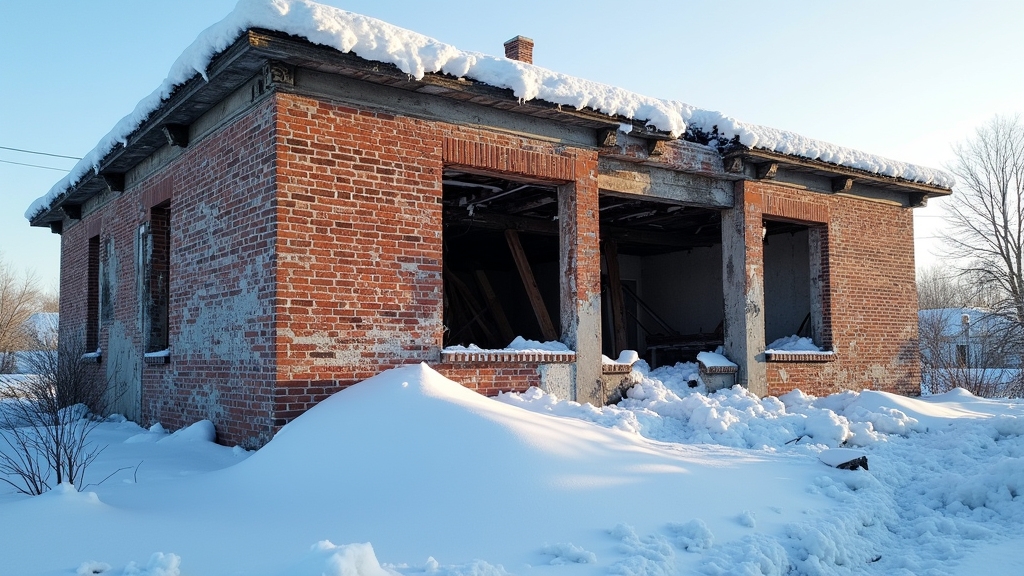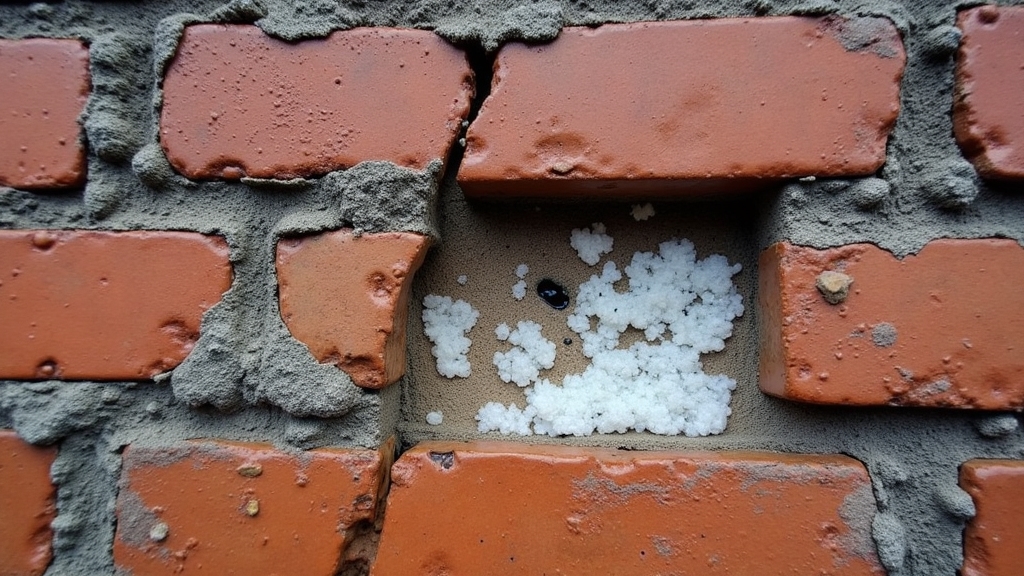In Michigan, harsh weather greatly affects masonry durability. Freezing temperatures can cause frost heave, damaging bricks and mortar. Heavy snowfall increases structural stress, risking deformation. Rain and humidity lead to moisture absorption, weakening bonds and causing efflorescence. Seasonal temperature fluctuations create expansion and contraction issues, resulting in cracks. To combat these challenges, regular maintenance and proper waterproofing are essential. Exploring best practices for masonry resilience can further enhance your understanding of these challenges.
Key Takeaways
- Freezing temperatures cause frost heave, leading to cracks and structural damage in masonry due to expanding ice within materials.
- Heavy snow loads increase stress on masonry elements, risking deformation or failure if accumulations exceed design limits.
- Moisture absorption from rain and humidity weakens masonry bonds, resulting in efflorescence and compromised structural integrity.
- Seasonal temperature fluctuations lead to expansion and contraction, causing cracking in mortar joints and spalling in brick surfaces.
- Regular inspections and maintenance, including sealing, are crucial to mitigate weather-related damage and enhance masonry durability in Michigan’s climate.
The Impact of Freezing Temperatures on Masonry

When temperatures drop below freezing, masonry materials can suffer significant damage if not properly protected. The primary concern is frost heave, a phenomenon where water trapped within the masonry freezes and expands. This thermal expansion leads to internal pressures that can fracture bricks, stones, or mortar joints.
As ice forms, it occupies more volume than liquid water, creating stress points that compromise structural integrity. Additionally, repeated freeze-thaw cycles exacerbate this issue, causing cumulative damage over time.
To mitigate these risks, you must guarantee proper drainage, use freeze-resistant materials, and implement suitable insulation techniques. By understanding these factors, you can enhance masonry resilience against the detrimental effects of freezing temperatures, ultimately preserving structural durability.
Effects of Heavy Snowfall on Structural Integrity

Although snowfall can create picturesque winter landscapes, heavy accumulations pose serious threats to masonry structures. The weight of snow, known as snow load, can greatly increase structural stress on walls, roofs, and foundations.
Heavy snow accumulations can threaten masonry structures, increasing stress on walls, roofs, and foundations.
When snow accumulates beyond design limits, it may lead to deformation or even catastrophic failure of masonry elements. The inherent properties of various masonry materials can exacerbate these risks, as some may not adequately support the additional load.
Regular assessment of snow load in relation to structural design criteria is essential to maintain integrity. You should also consider factors like the duration of snow cover and potential thaw cycles, which can further complicate structural stability.
Prioritizing preventive measures can mitigate the risks associated with heavy snowfall.
Rain and Humidity: Challenges for Masonry Materials

Rain and humidity pose important challenges for masonry materials, as moisture infiltration can compromise their structural integrity. Increased moisture absorption not only weakens the bonds within masonry but also encourages efflorescence formation. This phenomenon occurs when soluble salts dissolve in water and migrate to the surface, leading to unsightly white deposits that can damage the material over time.
| Challenge | Effect on Masonry |
| Moisture Absorption | Weakens structural bonds |
| Efflorescence Formation | Surface damage and aesthetics |
Understanding these challenges is vital for maintaining the durability of masonry in Michigan’s wet climate. Implementing proper waterproofing measures can greatly mitigate these risks.
Seasonal Temperature Fluctuations and Their Consequences
As temperatures shift dramatically between seasons, masonry structures face unique challenges that can impact their longevity. The constant cycle of freezing and thawing exacerbates the effects of temperature extremes, causing materials to expand and contract through thermal expansion.
Masonry structures are vulnerable to temperature shifts, leading to potential damage from freezing and thawing cycles.
This can lead to:
- Cracking in mortar joints due to stress
- Spalling of brick surfaces from water infiltration
- Deterioration of structural integrity over time
- Increased maintenance costs from repairs
Understanding these consequences is crucial. You must recognize that inadequate protection against these fluctuations can accelerate wear and tear, ultimately compromising the durability of your masonry.
Best Practices for Masonry Maintenance in Michigan’s Climate
Michigan’s climate presents unique challenges for masonry maintenance, particularly given the seasonal temperature fluctuations previously discussed.
To guarantee durability, you should routinely inspect your masonry for signs of damage, such as cracks or spalling. When you identify issues, employ effective repair techniques, like patching with compatible materials to prevent further deterioration.
Additionally, applying high-quality masonry sealants is vital; these create a protective barrier against moisture infiltration, which can exacerbate freeze-thaw cycles. Aim to reseal your masonry every few years, especially before winter sets in.
Always choose sealants specifically designed for your masonry type to enhance longevity. By adhering to these best practices, you’ll mitigate the adverse effects of Michigan’s climate and extend the lifespan of your masonry structures.
Frequently Asked Questions
How Do Temperature Changes Affect Masonry Curing Times?
Temperature fluctuations greatly influence curing processes. As you manage masonry, recognize that lower temperatures slow hydration, extending curing times, while higher temperatures accelerate it, potentially leading to inadequate strength if not carefully controlled.
What Types of Masonry Materials Are Best for Michigan’s Climate?
For Michigan’s climate, prioritize brick selection with high weather resistance, such as vitrified or engineered bricks. These materials withstand freeze-thaw cycles effectively, ensuring durability and preventing moisture-related damage in harsh conditions.
Can Masonry Structures Be Repaired After Severe Weather Damage?
Yes, you can repair masonry structures after severe weather damage. Conduct a thorough damage assessment to identify issues, then apply appropriate repair techniques, such as repointing or patching, to restore structural integrity and longevity effectively.
How Often Should Masonry Be Inspected in Michigan?
You should conduct masonry inspections at least twice a year, ideally during seasonal checks in spring and fall. This frequency helps identify potential issues early, ensuring structural integrity and longevity in Michigan’s variable weather conditions.
What Role Does Sunlight Play in Masonry Durability?
Sunlight exposure and UV radiation can weaken masonry materials over time. You should consider protective coatings to mitigate damage, as prolonged exposure may lead to surface degradation, compromising structural integrity and longevity of the masonry.
Final Thoughts
Michigan’s ever-changing climate—with its freezing winters, heavy snow, and persistent humidity—can take a serious toll on masonry structures. Without proper protection, these conditions lead to cracking, spalling, and gradual structural decline. The key to preserving your investment lies in proactive care: regular inspections, effective waterproofing, and timely repairs.
If your home’s masonry has been impacted by Michigan’s harsh weather, trust Premiere Masonry Rochester Hills to restore and protect it. Our experienced team specializes in masonry restoration, tuckpointing, lintel repair, and porch rebuilding—helping Michigan homeowners maintain durable, weather-resistant structures year-round.
Don’t wait until small cracks become costly repairs. Visit our services page or contact us today for a free inspection and expert advice. Let Premiere Masonry Rochester Hills help your property withstand Michigan’s toughest conditions with craftsmanship that lasts.

